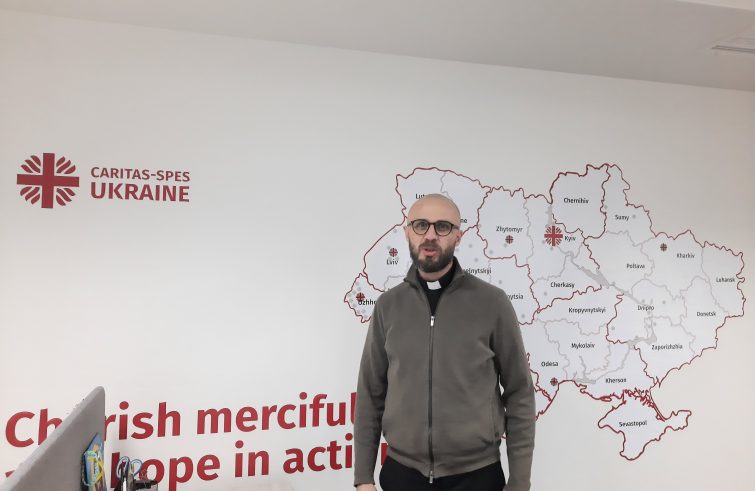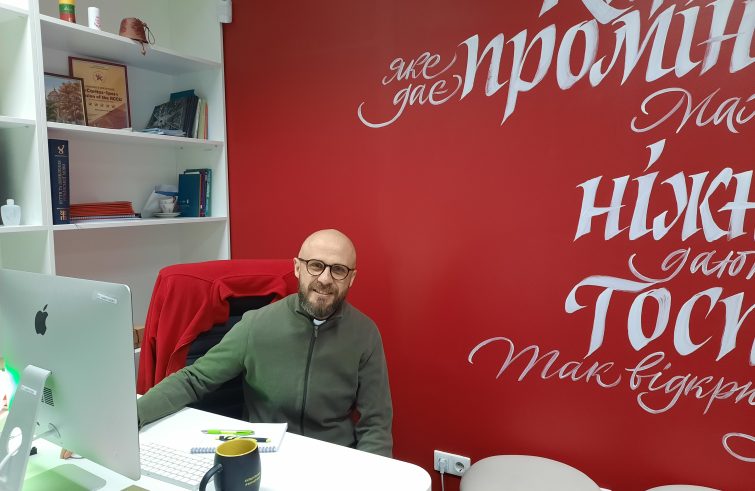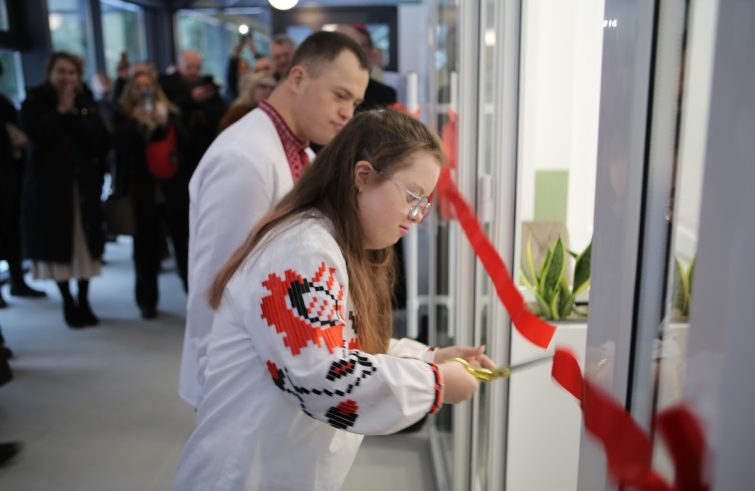
 (from Kyiv) Ukraine at war is a country that mourns its dead. Winter cold, shelters for lonely and disabled elderly. There are emergencies all around. But perhaps the most devastating element of the humanitarian crisis the Ukrainian people have suffered for two years is the loss of loved ones. Vyacheslav Grynevych, Director of Caritas-Spes Ukraine, whom SIR met in his office in Kyiv where he works with a large group of young people, gives an account of the situation. Ukraine is a large country, and since the beginning of the Russian aggression, Caritas Spes has been working hard on the various fronts of the emergency. We need people to deal with all the requests that come in and to coordinate the relief efforts. The large map hanging on the wall of the Kyiv office shows the widespread presence of Caritas-Spes throughout the country. The charity organisation currently runs 54 relief centres. After more than a year since the outbreak of the full-scale war, Caritas-Spes Ukraine, together with its partners, is actively serving 23 regions of Ukraine and is present in more than 15,000 settlements, including frontline zones. But operating in war zones can be hard. On the night of 19 September 2023, Russian troops hit an industrial warehouse in Lviv where Caritas-Spes Ukraine’s humanitarian aid was stored. The mission’s staff were unharmed, but the warehouse and all its goods were burnt to the ground. 300 tonnes of humanitarian goods were reduced to ashes.
(from Kyiv) Ukraine at war is a country that mourns its dead. Winter cold, shelters for lonely and disabled elderly. There are emergencies all around. But perhaps the most devastating element of the humanitarian crisis the Ukrainian people have suffered for two years is the loss of loved ones. Vyacheslav Grynevych, Director of Caritas-Spes Ukraine, whom SIR met in his office in Kyiv where he works with a large group of young people, gives an account of the situation. Ukraine is a large country, and since the beginning of the Russian aggression, Caritas Spes has been working hard on the various fronts of the emergency. We need people to deal with all the requests that come in and to coordinate the relief efforts. The large map hanging on the wall of the Kyiv office shows the widespread presence of Caritas-Spes throughout the country. The charity organisation currently runs 54 relief centres. After more than a year since the outbreak of the full-scale war, Caritas-Spes Ukraine, together with its partners, is actively serving 23 regions of Ukraine and is present in more than 15,000 settlements, including frontline zones. But operating in war zones can be hard. On the night of 19 September 2023, Russian troops hit an industrial warehouse in Lviv where Caritas-Spes Ukraine’s humanitarian aid was stored. The mission’s staff were unharmed, but the warehouse and all its goods were burnt to the ground. 300 tonnes of humanitarian goods were reduced to ashes.
 However, the biggest “shock” for these people is the death toll. “There is not a family that has not suffered a loss,” says the priest. “There are mothers who have lost a child and many others who are seeking news of their children who missing or who have stopped answering their mobile phones and of whom they no longer have any trace. Those who have not been able to recover their loved ones’ bodies always hope that the news of their death is a mistake and live in the often vain expectation that they will come back home one day.”
However, the biggest “shock” for these people is the death toll. “There is not a family that has not suffered a loss,” says the priest. “There are mothers who have lost a child and many others who are seeking news of their children who missing or who have stopped answering their mobile phones and of whom they no longer have any trace. Those who have not been able to recover their loved ones’ bodies always hope that the news of their death is a mistake and live in the often vain expectation that they will come back home one day.”
A long time will be needed to mourn, to heal the wounds, to heal the traumas, to prepare for reconciliation. “The city of Kyiv is seemingly normal,” adds the priest, “but our inner world is broken. What we have seen in Bucha is now in the depths of our hearts.”
On 1 November, only women were present to commemorate the dead, embodying the “brutality of war.” Some Ukrainian villages are completely empty of men. Grynevych describes a village near Kherson where an unusual request was made: women asked the charity if they could attend courses in tractor driving and agricultural skills. They were left alone to look after the farms because their husbands had all been sent to the front.
 In addition to the trauma of war, the economic crisis is exacerbated by soaring commodity prices and the difficulty of buying basic necessities. The number of poor is growing, as are the needs. “Everyone is exhausted. What worries us most is the lack of prospects for the future. But we all want to see a just peace, because if this were not the case, the dead whom we are mourning will have died in vain.” Meanwhile, Caritas-Spes continues its solidarity efforts. This year’s figures are full of life: 280,046 people received assistance in 2023, but a total of 1,048,546 people have been assisted since the outbreak of full-scale war. Shelter, food and basic needs, psychosocial support. Last winter alone, 15,120 people received blankets, warm bedding, heaters, stoves, generators and other items to protect them from the winter cold. In addition, 18,726 people received advice and information through the online helpline. In the village of Zarichany, an integrated centre for people with disabilities was inaugurated on 8 December. The centre is unique in that there is no such complex in Kyiv, Zhytomyr nor in many other regions. It has 26 bedrooms for 45 people with disabilities and their carers, 2 conference rooms and a modern chapel. The inauguration ceremony was attended, among others, by the Director of Caritas Italy, Fr Marco Pagniello, who visited Ukraine with a small delegation to inform the local Caritas organisations about the accompaniment and proximity activities that have been carried out. On the same occasion, Fr Pagniello announced that Caritas Italy and all the dioceses of the Catholic Church in Italy will support activities of pastoral care for children with disabilities initiated by Caritas-Spes Ukraine.
In addition to the trauma of war, the economic crisis is exacerbated by soaring commodity prices and the difficulty of buying basic necessities. The number of poor is growing, as are the needs. “Everyone is exhausted. What worries us most is the lack of prospects for the future. But we all want to see a just peace, because if this were not the case, the dead whom we are mourning will have died in vain.” Meanwhile, Caritas-Spes continues its solidarity efforts. This year’s figures are full of life: 280,046 people received assistance in 2023, but a total of 1,048,546 people have been assisted since the outbreak of full-scale war. Shelter, food and basic needs, psychosocial support. Last winter alone, 15,120 people received blankets, warm bedding, heaters, stoves, generators and other items to protect them from the winter cold. In addition, 18,726 people received advice and information through the online helpline. In the village of Zarichany, an integrated centre for people with disabilities was inaugurated on 8 December. The centre is unique in that there is no such complex in Kyiv, Zhytomyr nor in many other regions. It has 26 bedrooms for 45 people with disabilities and their carers, 2 conference rooms and a modern chapel. The inauguration ceremony was attended, among others, by the Director of Caritas Italy, Fr Marco Pagniello, who visited Ukraine with a small delegation to inform the local Caritas organisations about the accompaniment and proximity activities that have been carried out. On the same occasion, Fr Pagniello announced that Caritas Italy and all the dioceses of the Catholic Church in Italy will support activities of pastoral care for children with disabilities initiated by Caritas-Spes Ukraine.
“Their visit,” commented Fr Grynevych, “was very important for us. A long-term intervention strategy is expected due to the war, and without the help of the Caritas family we would not be able to cope. The visit of Caritas Italy makes us feel that we are not alone.”











